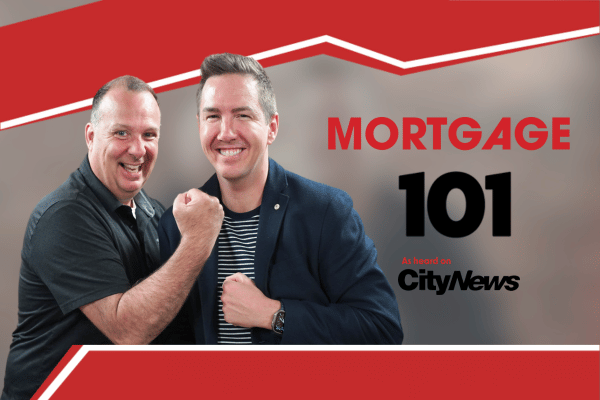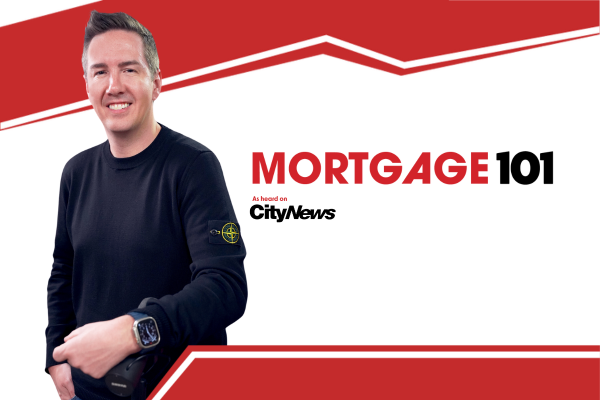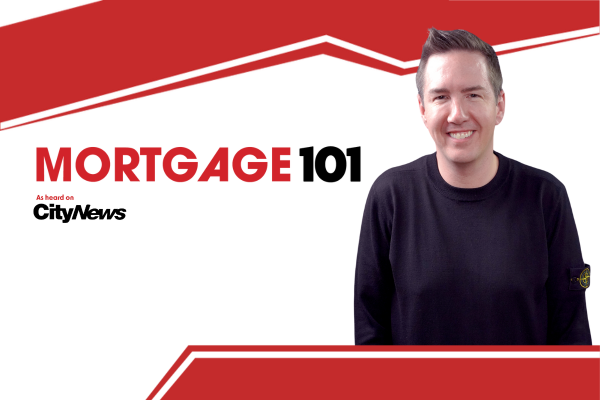In a brand new edition of Mortgage 101 live from CityNews, Clinton Wilkins and Todd Veinotte discuss the spring real estate market, finding the right lender for you, and what's happening with today's property taxes. They also discuss learning about fixed vs variable rates.
Mortgage 101 – how should I prepare for a refinance? | March 2022 Part 3
In this episode of Mortgage 101 with Clinton Wilkins and Todd Veinotte, as heard on CityNews 95.7, the guys talk about how borrowers should prepare themselves for a refinance. If you bought a home before 2020, you likely have seen an increase in the equity in your home. Borrowers are leveraging this equity with a refinance to put themselves in a better financial position. You can pay down unsecured debt, do renovations on the home, or even put it towards investments. Learn more in the video or transcript below!
Mortgage 101 with Clinton Wilkins & Todd Veinotte: How should I prepare for a refinance?
Don’t feel like watching the video? Check out the transcript below.
Transcript:
It’s time to talk refinance
Todd Veinotte: [00:00:00:03] Welcome back to Mortgage 101: Your Guide to Homeownership with Clinton Wilkins and myself, Todd Veinotte, in the fine cities of Halifax and Ottawa, and we’ve been talking about refinance now. So we’re going to get to it even though you tried to push the agenda to something else and I said no. We have teased our audience long enough. It’s time to talk refinance.
Clinton Wilkins: [00:00:17:12] So if you’re an existing home owner, this segments for, you.
Todd Veinotte: [00:00:20:26] No, more importantly, if you’re an existing home owner with equity in your house, the segment’s for you.
Clinton Wilkins: [00:00:26:07] You know what, I think if you bought your home prior to 2020 in in most areas,
Todd Veinotte: [00:00:31:09] You should have equity.
Clinton Wilkins: [00:00:32:01] You should probably have a good amount of equity.
Todd Veinotte: [00:00:33:04] If you don’t have equity in your house and you bought prior to 2020, You’ve got some serious problems.
Clinton Wilkins: [00:00:38:00] Or you might have bought in a market or an area that maybe hasn’t seen the growth. I don’t know. I’m going to be nice. I’ll be the good guy here.
If you purchased before 2020, you likely have equity in your home
Todd Veinotte: [00:00:47:05] The vast majority of people who purchased before 2020 would have equity in their house, that they had not envisioned. Is that safe to say?
Clinton Wilkins: [00:00:53:20] I would certainly agree with you. In Halifax in our market, pre-pandemic, the average house prices were going up one, two three per cent per year. Here’s an interesting stat though: We were starting to see spikes in growth and prices in 2019, even before the pandemic.
So, you know, Halifax is a desirable place to be. We have affordable housing here, even though maybe if you live in Halifax, it doesn’t feel affordable. But if we look at other areas across the country, our average house price for a detached home is about $500,000.
And that is very reasonable compared to other areas, and I would venture to say that’s a reasonable even compared to Ottawa. At one time, our market was very similarly priced. You know, a lot of federal government employees, a lot of federal government employees here in Halifax and our housing prices, were similar. Now, you know, Ottawa is still significantly more expensive than Halifax.
What does a good candidate look like for a refinance?
Todd Veinotte: [00:01:48:25] Okay. So refinancing what makes somebody a good candidate to refinance, besides having equity in the house?
Clinton Wilkins: [00:01:58:07] You know, I think the other factors, really, we look at income and really what is the reason for the refinance and what’s going on with your current term? You know, obviously that’s important. If you’re going to do a refinance midterm, you’re going to pay a penalty. In most cases, unless you’re going with the with the same lender and even in some of those cases, you would still pay a penalty.
The people who are refinancing midterm, majority of those people are in a variable rate, because if you’re in a variable and you break your mortgage early, it’s only three months interest to get out. If you were to break your term early and you were in a fixed rate, you could pay a much larger penalty.
Todd Veinotte: [00:02:35:14] How much more?
Clinton Wilkins: [00:02:36:20] It’s either three months interest or an interest rate differential, which ever is higher. The banks are like the casinos: They never lose. Obviously, we look at income and we look at credit when we’re doing a refinance, just like any transaction that we do.
How do you determine the market value of the house?
And a little bit of the mechanics of a refi, how it works, you can refinance up to 80 per cent of the current market value, and the market value really means what you could sell your house for right now.
Todd Veinotte: [00:03:02:11] Who determines that?
Clinton Wilkins: [00:03:04:03] Usually we get the, you know, insight from the consumer. They usually have a pretty good idea about what their home is worth, and that’s what we’ll start with. And then sometimes lenders are able to use a low ratio valuation system, so they’re using data from the Canadian Mortgage and Housing Corporation from CREA, and, you know, obviously any sales that happen within the municipalities. You leverage that data to see if the property value is accepted.
If it’s not accepted automatically, then you would require to get a full appraisal. We would order the appraisal and we’re required to order it, and sometimes we can order it directly from the appraiser, depending on which lender we use. Or sometimes we have to order an appraisal through a management company. And you know, we’ll order it, we’ll send the link to the consumer to pay for the appraisal, and then the appraiser would reach out to the consumer to schedule the time to do the inspection and then prepare the report.
When we get the valuation solidified, you know, if that is through the low ratio evaluation system or if it’s full of from a full appraisal, we can then do the mortgage for a maximum of 80 per cent of that value.
Clinton Wilkins: [00:04:12:28] And from that new mortgage, obviously, we have to pay out what you owe already. So that would pay out like any mortgages that were registered to the title of the home, any secured debt like a HELOC or any of those things that would be paid and then any of the proceeds we could use that to, you know, obviously pay down other consumer debt, do renovations, and I’m seeing a lot of consumers obviously do investments.
Emerging trend: Parents refinancing to give six figure gifts for their kids to buy homes
A really interesting trend that I’m seeing right now, Todd, I’m seeing a lot of parents either refinance their home or leverage their home or, you know, remortgage their home or whatever you want to call it, to give a gift to their kids to get into the housing market. I’m seeing a lot of young people, first-time home buyers buying homes, and they have gifts to the tune of six figures.
Todd Veinotte: [00:04:57:08] Wow.
Clinton Wilkins: [00:04:57:26] And in some cases, they need it. If you put down 20 percent or more as a first-time home buyer, you can avoid the Canadian Mortgage and Housing Corporation, the insurance and our debt servicing ratios,
Todd Veinotte: [00:05:09:10] Why would they need six figures for a down payment?
Clinton Wilkins: [00:05:11:04] Well, if the average house price is $500,000, you might need $100,000 down to be able to make the numbers work, in many cases. The rule of thumb around affordability, we look at the household income and from the household income, any borrowers that are contributing to that income would need to be on the title.
Obviously, we can do the mortgage just in one person’s name, but if both are going to be on the title or which would also be on the mortgage, the title and the mortgage have to be the same. We can lend typically four to four and a half times the consumer’s income for a mortgage.
So for example, if the household income is. $100,000, let’s say, a year, maybe between one borrower or two borrowers. That means that we can do a mortgage of anywhere between $400,000 and $450,000. You know, that has to be supported by the property value.
You know, that can’t be any more than 80 per cent of what the property value is, if we’re doing a refinance. And a lot of consumers are doing this right now. We’re doing a lot of refis. Yeah, which is very different from what’s happening currently in the United States. Refinances are actually down about 60 per cent in the U.S.
U.S. housing market is different than Canada’s
Todd Veinotte: [00:06:18:22] Why?
Clinton Wilkins: [00:06:20:14] I don’t I don’t know the whys. I think part of it is they might not have weathered the storm quite as good as we did from the pandemic. So I think that’s obviously a consideration. And I don’t think they had the growth in the property values that we have had.
Todd Veinotte: [00:06:36:00] And they had a huge subprime meltdown as well in 2008 so perhaps there’s,
Clinton Wilkins: [00:06:40:20] Their market is very, very different.
Todd Veinotte: [00:06:42:09] Yeah, very different. I don’t know if it’s as heavily regulated as it is here in Canada. Even the banking industry in general.
Clinton Wilkins: [00:06:49:14] Yeah, there are hundreds, if not thousands, of banks in the U.S., where in Canada we have a very stable and structured banking system, which is great. You know, our consumers are protected and you know, our consumers are getting the right amount of disclosure and information on their mortgage. So, you know, I think the way that we do it in Canada is good.
A refinance needs to put you in a better financial position
I think that a lot of the reasons that consumers will take a five year term, whether that’s a variable or whether that’s a fixed is the bonds are out typically for that amount of time. So, you know, just like any market, it’s cyclical. Things go up, things go down. Currently, obviously, we are in an increasing rate environment.
And you know, some borrowers want to make a move now before the renewal, and some borrowers are willing to pay a penalty just to refinance early. And if you’re looking to do that just to lock in the rate, I don’t know if it’s worth it, to be honest. Wait to the renewal. But if you’re looking to do a refinance with an objective, then yes, sometimes that will make sense.
And usually what we say is, you know, it needs to make sense for us to do it. You know, we just don’t want to do a refinance for the sake of doing a refinance. We need to be able to put the consumer in a better financial position. That’s really our goal.
How should I prepare for a refinance?
Todd Veinotte: [00:08:14:29] So if somebody wants to refinance some things that they can do in advance and prep work they can do in advance, obviously, is get some documents together. What advice do you give people so that they kind of hit the ground running, so they don’t meet with you and you have to start from scratch?
Clinton Wilkins: [00:08:29:00] Well, I think I think the one thing is it’s like you should know about your credit looks like. Oftentimes we ask people, I’m like, “How does your credit look?” I don’t need to know what your score is. We’ll get that through our system. But I like to just know what is the matrix of your credit like? Is it good? Is it bad? Is it ugly? You know, what’s kind of going on there.
We usually recommend borrowers download, Borrowell and Credit Karma. They’re free apps. You can see what’s going on with your credit and then have your income documents readily available.
If you are an hourly or a salary employee and of you any variable income, we need the last two years of your T4s in your current pay stub. If you’ve just changed jobs recently, we’ll need a pay stub and a job letter.
If you’re self-employed and you’ve been self-employed for quite some time, you know two, three plus years, we would need the last two years of your tax returns and your notice of assessment.
And if you’re self-employed, there certainly are other programs out there. So if you’re not, maybe claiming enough income on your income tax to make it work, you know, there’s some stated income programs out there.
And if you’re newly self-employed, there are some good programs for those people, too. You know, the federal government really wants to kind of cut the red tape in terms of, you know, self-employment.
More and more Canadians are becoming self-employed every day, and maybe you want to do a refinance to inject maybe some capital into your business? I don’t know.
But we’re certainly seeing a lot of self-employed people and there are programs that are available out there that can really make it make sense. And maybe that’s a shorter term mortgage. You know, maybe it’s a one or two year term.
We can usually justify income loss from the pandemic
Todd Veinotte: [00:10:03:00] For some people who’ve been self-employed over the last couple of years, like a lot of self-employed people, they’ve had struggles and they’ve had to rely on some government assistance.
Clinton Wilkins: [00:10:10:17] Of course.
Todd Veinotte: [00:10:10:24] Like a lot of people have. Yeah. How does that factor into all of this?
Clinton Wilkins: [00:10:15:01] You know, if the income is down, you know, if we can justify it, sometimes we can look at something like a three year average. You know, we’re seeing that for, you know, people that are in the, you know, hairstylists, spas, fitness, travel. We’re able to do a three year average.
I think in some of these cases, obviously, if it’s recovered in their back to kind of like a normal schedule, you know, we can’t avoid government shutdowns. And I think the lenders understand that. But we need to be able to justify with some documentation. If you’re self-employed in your income was negatively impacted, maybe a stated income program works better for you. And oftentimes these state income programs might be really more leveraged on what’s going on in your bank account.
So maybe we’ll get six months or 12 months, or your bank statements to kind of justify that income. And there’s lots of lenders out there that will do, you know, stated income programs, it might not be a bank lender, Todd. Bank lenders typically want the income tax to show what the income is, right? But I know lots of self-employed people that make really great income, but on their income tax, it shows that they’re making $30,000 a year. I see it.
Todd Veinotte: [00:11:25:11] Is that legal?
Paying more income tax vs paying a higher interest rate
Clinton Wilkins: [00:11:26:26] I mean, it obviously, if your expenses that you’re putting into your business can be claimed. I’m not an accounting person and I’m not the CRA, so I don’t know. But here’s an interesting adage, we’ll say, I’m trying to think about something how to say this appropriately. You can either pay more income tax or maybe you have to pay a higher interest rate.
I have a funny like a little like, I don’t know if it’s appropriate for the radio. And I don’t want to offend anyone. But you know, you either have to pay more income tax or in some cases, if you’re self-employed, you have to pay a higher rate if we have to do some of these stated income type programs.
Todd Veinotte: [00:12:03:25] All right, we’ve got another segment to go. What do you want to talk about? Putting you on the spot right now, what do you want to talk about?
Clinton Wilkins: [00:12:09:04] We’re going to talk a little bit about what’s going on in the housing market here in Halifax. Obviously, if you’re here in Halifax and you’re listening, you’re living it. And for our listeners in Ottawa, some of you may be wanting to move to Halifax and Atlantic Canada, and we’d love to welcome you with open arms. We just want to kind of give you a little update on what’s going on.
Todd Veinotte: [00:12:27:13] Okay, Mortgage 101: Your Guide to Homeownership returns when we come back.
If you have any questions, get in touch with us at Clinton Wilkins Mortgage Team! You can call us at (902) 482-2770 or contact us here.


